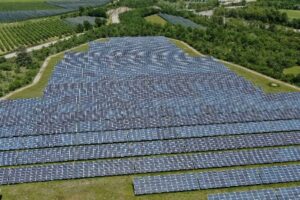As Revolution Wind stalls, CT clean energy workers are adrift

When the Trump administration announced its Aug. 22 decision to halt a nearly-completed offshore wind project, alarm bells immediately went off for clean energy advocates and business leaders in Connecticut.
The Revolution Wind project, a 65-turbine clean energy initiative that would provide roughly 700 megawatts of energy to homes in Connecticut and Rhode Island, was expected to reduce energy costs in the region. The project is roughly 80% complete, with more than 1,200 workers involved in the effort.
But with the project’s abrupt freeze, many of those workers have been pushed out of work, disrupting a source of high-paying local jobs and leaving local union workers searching for answers.
“A lot of building trades workers, a lot of union workers voted for Donald Trump and his team. But they didn’t vote to have union jobs shut down,” Patrick Crowley, the president of the Rhode Island AFL-CIO, told USA Today this week. “It shouldn’t work like this.”
The decision has also raised larger concerns about how the administration is handling already ongoing projects.
“We were surprised that he shut down a project that’s 80% complete,” said Aziz Dehkan, the executive director of the Connecticut Roundtable on Climate and Jobs. “I could almost see him stopping nonpermitted or projects that are in the permitting process. But to close down a project that’s 80% complete seems to be a little out of line here.”
[RELATED: Trump admin cancels $679M for offshore wind projects as industry reels]
In the days since the project was halted, advocates for the Revolution Wind project and clean energy initiatives more broadly told The Connecticut Mirror that the incident raises concerns that go beyond a singular project.
They also point to a broader climate of uncertainty that has been created by the past few months of policy changes affecting wind and solar programs. Those concerns have grown as the Trump administration reverses many of the energy policies of the Biden administration, including elements of the 2022 Inflation Reduction Act that provided incentives for clean energy projects around the country.
The uncertainty, advocates say, is contributing to further disruption in the industry as the clean energy sector shifts to avoid further setbacks from the federal government. The result could have serious economic implications, halting the industry’s once rapid job growth, limiting investments in new projects and curtailing the continued development of what clean energy supporters see as a vital part of America’s energy economy.
“Over the last six months, the landscape has really changed dramatically,” said Mike Trahan, executive director of the Connecticut Solar and Storage Association, which represents solar companies working in Connecticut. “How do you work your way through all those changes to stay competitive and stay in business?”
A growing industry thrown into chaos
Connecticut isn’t at the top of the list when it comes to its clean energy workforce. The state ranks 27th in the nation, employing roughly 44,000 clean energy workers. That’s around 60% of all energy and motor vehicle jobs in the state, according to E2, a national organization focused on finding common ground between energy advocates and business groups.
Still, the state has benefitted from recent investment in clean energy — largely defined as efforts to harness the power of wind, solar, and renewable energy sources — in the past few years. The Revolution Wind project, as well as various “Solar for All” initiatives, have fueled demand for a workforce skilled in clean energy technology, installation, manufacturing and storage.
In recent months however, that has shifted.
“There’s been more than $22 billion worth of private sector investments in clean energy projects, ranging from offshore wind to electric vehicle production to solar panel factories, that have been canceled in just the past eight months alone,” said Bob Keefe, E2’s executive director. “Unfortunately, it looks like those numbers are going to continue in the wrong direction, which is bad for any of us who depend on electricity or, like, jobs in America.”
Much of the industry has been at least in part affected by new policy changes in Washington. In January, the president issued an executive order calling for a halt to the disbursement of any remaining funds allocated under the Inflation Reduction Act.
In July, passage of the Trump-supported budget reconciliation bill included a phase-out of federal tax credits that incentivized solar and wind. Earlier this month, news reports noted that the administration was also planning to claw back some $7 billion in grant money allocated to the Solar for All initiative, a national program to improve access to solar in low-income and disadvantaged communities.
Those changes, Keefe said, have put the potential economic benefits of solar and wind projects in jeopardy.
“We saw what was truly an economic revolution in the making,” he said. “But now all of that has been put at risk because companies have no more market certainty given this current administration. The tax credits and the policies that they were told were going to be in place for 10 years have suddenly been pulled out from underneath them.”
The shift has sparked concerns that the clean energy sector will contract significantly, impacting jobs and limiting the possibility of future projects. According to a June estimate from the Solar Energy Industries Association, earlier versions of the budget reconciliation bill would put some 330,000 “current and future jobs across the country” at risk. A separate state-by-state analysis from the group found that around 2,900 jobs in Connecticut could be impacted.
“Lost jobs in every single state are a recipe for disaster for American families, businesses, and the U.S. economy,” SEIA president and CEO Abigail Ross Hopper said in a statement earlier this year.
A ‘psychological challenge’
In interviews this week, clean energy advocates and business experts voiced deep concerns about the Trump administration’s reversal of energy policy, framing the sudden halting of Revolution Wind as particularly alarming. But advocates stopped short of saying that the project’s abrupt pause is a harbinger of future economic difficulties in the industry or larger job issues in the state.
Rather, advocates argued that the changes add to an ongoing sense of uncertainty and instability in the clean energy sector more broadly. That uncertainty, they said, could ultimately prove as damaging as any policy changes, as companies retreat from clean energy projects and investors pull away to avoid issues with the federal government.
“That’s the psychological impact that really discourages people,” said Tony Sheridan, the president and CEO of the Chamber of Commerce of Eastern Connecticut.
That concern was at the top of mind for Kyle Wallace, the then-vice president of public policy and government affairs of solar developer PosiGen, when he spoke to the Connecticut Mirror last month. “We’re just continuing to see an administration that is just actively hostile to renewables, and we had hoped that they would be more indifferent and not actively hostile,” he said.
Wallace confirmed to CT Mirror this week that he was one of the employees affected by PosiGen’s recent announcement that it was laying off a significant number of its workforce, including 78 workers in Connecticut.
In a WARN notice announcing the layoffs, the company, which has been active in state “Solar for All” initiatives and focuses on providing solar to low-income and disadvantaged households that would be unable to afford it, cited financial difficulties as the main factor behind the layoffs.
“These business circumstances were not reasonably foreseeable and arose in an increasingly challenging economic environment that already has forced several other major companies in the renewables industry to cease or significantly reduce their operations,” John Truschinger, the company’s chief administrative officer, explained in the notice.
PosiGen did not immediately respond to a request for further comment.
The PosiGen layoffs have sparked further concerns about the state of the clean energy workforce in Connecticut, with some state lawmakers laying blame squarely at the feet of the federal government.
“President Trump talks a big game about standing up for the working man, but the truth is he’s left 78 Connecticut families without a paycheck,” Senate Majority Leader Bob Duff, D-Norwalk, said in a statement this week. “These are blue-collar jobs that built our clean energy future. Now they’re gone because Trump needed the money for tax cuts for billionaires and his corrupt circle.”
Others see the layoffs in a different light. Trahan of the Connecticut Solar and Storage Association said he thinks ultimately, PosiGen “did everything right.”
“I don’t think people should be looking at that as indicative of what the industry as a whole is facing,” Trahan said, noting that the organization faces specific funding issues. His organization is currently working with former Connecticut PosiGen employees to help them find work in the state.
Still, after a tumultuous few months, clean energy supporters, industry organizers and business group leaders say that companies will need to remain resilient if they plan to continue operating.
“If you want to be successful or you want to sustain your business, you’ve got to be willing to adapt to change,” Trahan said. “And that’s what they’re doing right now.”






